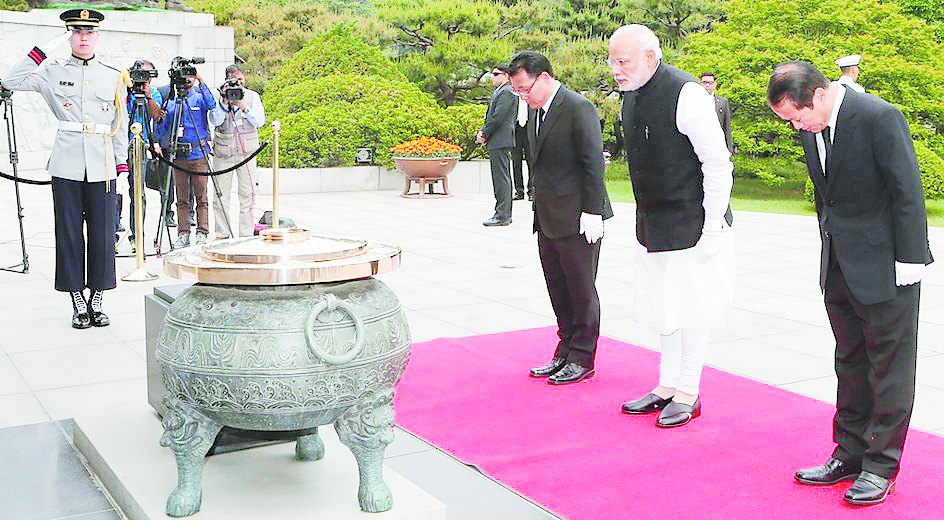
It did not come as a surprise that Narendra Modi did not tell Indians living in South Korea, whom he addressed on Monday afternoon, that they should persuade Koreans to visit India.
When the Prime Minister addressed the diaspora at Madison Square Garden in New York on September 28 last year, he urged each person of Indian origin at that mega event to prevail upon Americans to go and see India.
At his similar, although smaller, event in Shanghai on Saturday, Modi made a similar plea to Indians in China as a way of promoting people-to-people relations.
What is heartening about this significant omission in Seoul is that the Prime Minister has done his homework on Indo-Korean relations before finalising his itinerary and agenda. Tourism promotion to India is one of the minor scandals in New Delhi's bilateral relationship with Seoul.
It was the late M.O.H. Farook, the minister in charge of tourism in P.V. Narasimha Rao's government, who first discovered the attractions of going to South Korea for tourism promotion.
Farook, who died as Kerala governor three years ago, managed to escape Delhi's searing summer in 1992 by getting Rao's permission to attract tourists from South Korea. His successors fine-tuned what Farook started. The minister and a large retinue of officials managed to get on the first-ever prime ministerial visit to Seoul the following year, making out a case to sign a formal agreement on cooperation in tourism.
Shortly thereafter, Ghulam Nabi Azad, who assumed charge of both civil aviation and tourism, visited Seoul even though the Rao government was in its sunset period.
Soon enough, state governments latched on to the idea: "Fly to Seoul, Korean tourists are waiting to flock to India." Mayawati went as chief minister to convince Koreans about the attractions of Buddhist sites in Uttar Pradesh. Those in charge of tourism in Lalu Prasad's Bihar joined the bandwagon too as did some other states.
*******************
It is to the credit of Atal Bihari Vajpayee's Prime Minister's Office (PMO) that it wanted results before another ministerial visit to Seoul for attracting tourists was sanctioned.
Every time a proposal came from the tourism ministry, Brajesh Mishra, who ran the external affairs ministry by proxy for years as Vajpayee's principal secretary, quietly issued oral instructions to the ministry to deny political clearance for such visits.
As soon as the government at the Centre changed following Vajpayee's failed bid for re-election, the UPA government's first minister in charge of tourism, Renuka Chaudhary, hotfooted it to Seoul with a scandalously large delegation. Obviously, tourism officials wanted to make up for lost opportunities denied to them by Vajpayee's PMO.
Ambika Soni, who later got the portfolio made sure that Seoul was not left out of her travel schedule. Even Subodh Kant Sahay, who succeeded Soni made sure that he went to Seoul.
Diplomats at the Indian embassy in Seoul, who made preparations for Modi's arrival this week, estimate that at least 50,000 people would have been engaged in failed tourism promotion from South Korea to India between Farook's visit 23 years ago and now.
The crying shame is that 50,000 is also the pathetic number of South Korean tourists who visit India every year, according to Skand R. Tayal, who was India's ambassador to South Korea for three years from 2008. He points out in his well-documented book, India and the Republic of Korea: Engaged Democracies, that in excess of 10 million South Koreans travel abroad every year. No wonder, Modi completely skipped the subject.
**********
When Modi addressed the Indian community in South Korea within hours of his arrival in Seoul, the non-resident Indians were characteristically enraptured.
But the Koreans who were minding the arrangements, especially members of their Secret Service protecting Modi, it was clear from live TV coverage, had a sense of déjà vu.
Their expressions signalled that they had seen all this before unlike Americans who were variously impressed or bewildered by a foreign leader's rally in their midst. After all, the numbers at the Madison Square Garden equalled those of their state party conventions. The Chinese, who are unused to such gatherings, did not quite know what to make of it. Not the Koreans, though.
A South Korean functionary at the very top of their government who was in New Delhi a few weeks ago to iron out some creases in preparations for the Prime Minister's visit claimed in private conversations that Modi had taken a leaf out of the South Korean book in his interactions with the diaspora during official foreign visits.
This official, who understandably wishes to remain anonymous under the circumstances, claimed that the practice of visiting leaders meeting compatriots abroad in such large numbers was started by Kim Young-sam, the democratically chosen President of South Korea, who ended a long political winter of dictatorship.
The first civilian to hold presidential office in three decades, Kim met the Korean diaspora wherever he went. The advance party for Kim's visit to India three years after he took office in 1993 told Shankar Dayal Sharma's staff in Rashtrapati Bhavan - where state guests stayed then - that their President wanted to invite all South Koreans living in India to Rashtrapati Bhavan.
No other visiting head of state had made such a request before. But the meeting with the diaspora went off well by all accounts.










